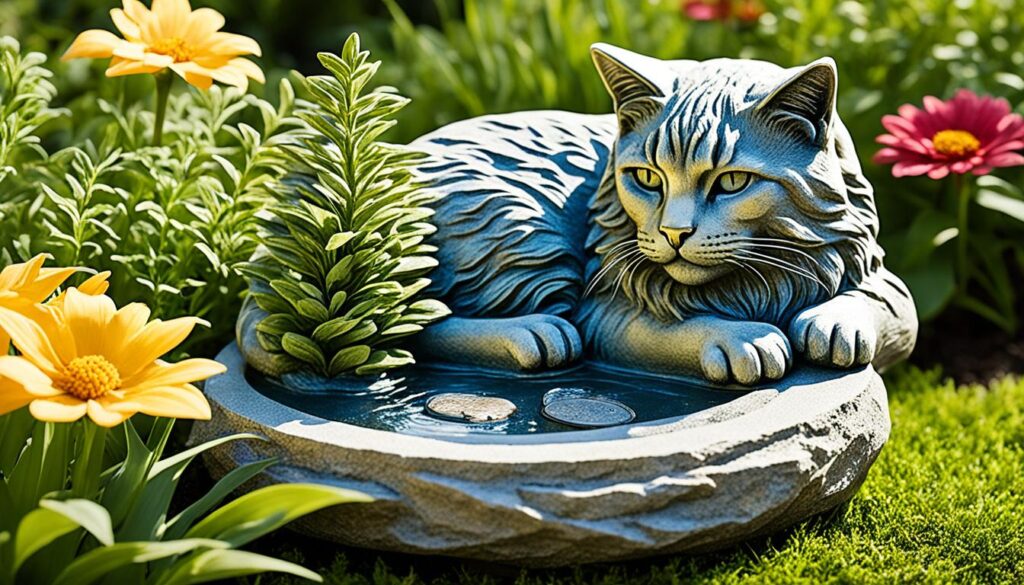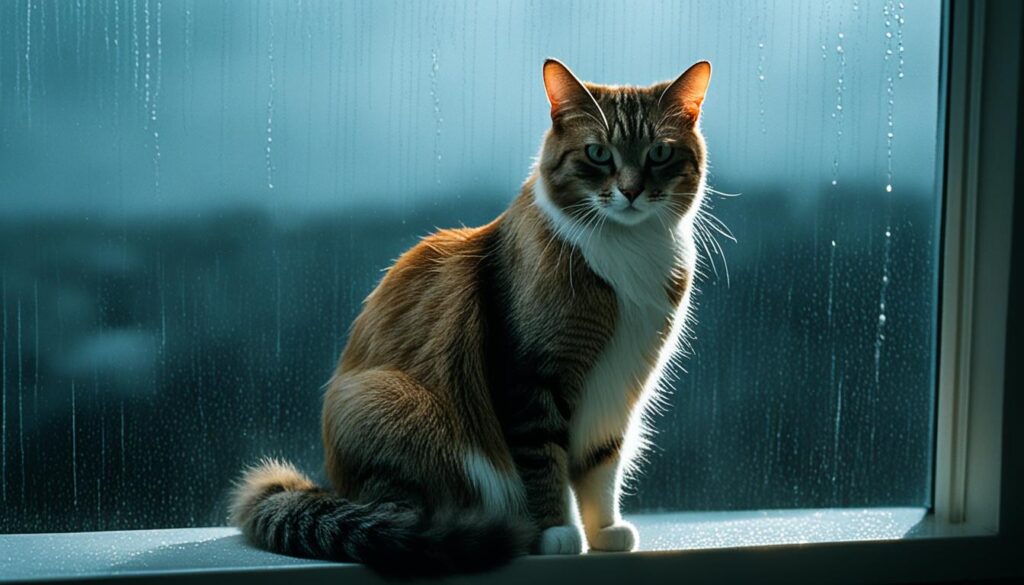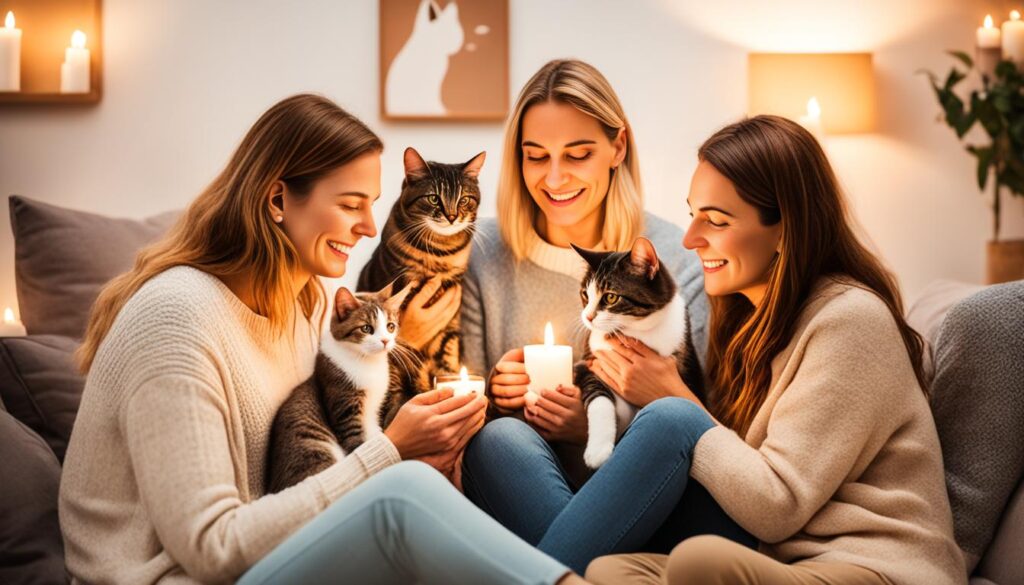Losing a beloved cat can be a heart-wrenching experience. The bond we share with our furry friends goes beyond words, and their absence leaves a void that can be difficult to fill. But in these moments of grief, there is solace to be found in the teachings of Buddhism. As Buddha once said, “In the end, only three things matter: how much you loved, how gently you lived, and how gracefully you let go.” These words remind us that the path to healing lies in embracing our love, living mindfully, and finding acceptance in the face of loss.
Key Takeaways:
- Grieving the loss of a cat is a natural and valid experience.
- Buddhist teachings can offer guidance and solace during times of pet loss.
- Understanding the stages of grief can help in navigating through the healing process.
- Honoring your cat’s memory and finding support are crucial for healing.
- Self-care and self-compassion are essential during the grieving process.
Understanding The Stages of Grief
Grief is a universal experience that arises when we lose something or someone dear to us. Coping with the loss of a beloved cat can be a challenging and emotional journey. Understanding the stages of grief can help you navigate through the complex emotions and find solace in the healing process.
Denial: In the initial stage of grief, it is common to feel a sense of denial or disbelief. You may find yourself unable to accept the loss of your cat, clinging to the hope that they will return or doubting the reality of their absence.
Anger: As the reality of the loss sets in, you may feel anger towards various aspects of the situation. This anger could be directed towards yourself, others involved, or even towards your cat for leaving you. It is important to acknowledge and express your anger in healthy ways.
Bargaining: The bargaining stage involves attempting to negotiate or make deals, often with a higher power or the universe, in an attempt to reverse the loss. It is natural to search for ways to bring your cat back or to question what could have been done differently.
Depression: Feelings of profound sadness and emptiness are characteristic of the depression stage. The realization of the permanent absence of your cat may lead to a deep sense of grief, withdrawal, and loss of interest in activities that were once enjoyed.
Acceptance: The final stage of grief is acceptance. This does not mean forgetting or getting over the loss, but rather coming to terms with the reality and finding a place of peace within yourself. Acceptance allows for healing to occur, enabling you to move forward while cherishing the memories of your cat.
It is important to note that everyone’s grief journey is unique, and these stages may be experienced in different orders or intensities. The grieving process is not linear, and it is normal to revisit certain stages or experience them simultaneously. Give yourself permission to experience and express your emotions fully.
Seeking support from loved ones who understand your pain can provide comfort and reassurance. Additionally, professional counselors who specialize in pet loss are equipped to guide you through the bereavement process. Remember, you are not alone in this journey, and there are resources available to support you along the way.
What Should I Do Now?
After the loss of your beloved cat, it is natural to feel a profound sense of grief and sadness. During this difficult time, finding ways to honor and remember your furry friend can provide comfort and aid in the healing process. Here are some suggestions to help you cope with pet loss and find closure:
Create a Meaningful Memorial
To honor your cat’s memory, consider creating a personalized memorial. This can include items such as a beautiful cremation urn, a framed photograph capturing special memories, or a dedicated memorial garden in your backyard. By creating a physical tribute, you can have a tangible reminder of the bond you shared.
Grieve Together with Loved Ones
Sharing your grief with family and friends who also loved your cat can provide solace and understanding. Organize a memorial service or a small gathering where everyone can share stories, memories, and emotions. This shared experience can offer comfort and support during this challenging time.
Seek Professional Grief Counseling
If you find it difficult to cope with the loss on your own, consider reaching out to a professional grief counselor who specializes in pet loss. They can provide guidance, support, and techniques to help you navigate through the grieving process. Talking to someone who understands the unique bond between humans and animals can be immensely healing.
Join a Pet Loss Support Group
Connecting with others who have also experienced pet loss can be incredibly valuable. By joining a pet loss support group, either in your local community or online, you can find a safe space to share your feelings, receive empathy, and gain insight from others who have gone through a similar journey. Together, you can find comfort and strength.

Take Time to Grieve and Heal
Remember that grieving is a necessary and individual process. Allow yourself the time and space to experience the full range of emotions that come with pet loss. There is no right or wrong way to grieve, and healing happens at its own pace. Be patient with yourself and practice self-compassion during this challenging time.
Honoring your pet and finding closure after their loss is an important part of the healing process. By memorializing your cat, seeking support from loved ones and professionals, and allowing yourself to grieve, you can commemorate the life and love you shared with your furry companion.
Dealing with Uncertainty
The uncertainty of not knowing the fate of your missing cat can be incredibly distressing. It can leave you feeling anxious, worried, and overwhelmed. However, it is important to remember that uncertainty is a natural part of life, and learning to cope with it can help you find peace amidst the unknown.
When dealing with uncertainty, it can be helpful to focus on the things that are within your control. Take proactive steps to search for your cat, such as contacting local shelters, posting flyers in your neighborhood, and reaching out to online pet communities. By taking action, you can regain a sense of empowerment and feel more in control of the situation.
Practice mindfulness to ground yourself in the present moment. Mindfulness involves paying attention to your thoughts and feelings without judgment, allowing you to better navigate through uncertainty. Take some time each day to engage in activities that promote relaxation and focus, such as meditation, deep breathing exercises, or gentle yoga.
Seek support from loved ones who can provide comfort and understanding during this challenging time. Talking about your fears and concerns with someone who cares about you can help alleviate anxiety and provide you with much-needed emotional support. Surround yourself with positive and uplifting people who offer encouragement and hope.
Avoid listening to negative or discouraging comments from others. Everyone copes with uncertainty differently, and some individuals may unintentionally say things that exacerbate your anxiety. Instead, focus on positive affirmations and visualizations that bring you peace and hope. Remind yourself that uncertainty is temporary and that there are still possibilities for a happy reunion with your beloved feline companion.
Remember, navigating through uncertainty takes time and patience. It’s essential to acknowledge your feelings and allow yourself to grieve the loss of your cat while holding onto hope. Stay committed to the search efforts and maintain a positive mindset. By managing your anxiety and finding peace in uncertainty, you can navigate this challenging journey with strength and resilience.

| Strategies for Dealing with Uncertainty |
|---|
| Focus on the things you can control |
| Practice mindfulness and relaxation techniques |
| Seek support from loved ones |
| Avoid negative comments and focus on positive affirmations |
Taking Care of Yourself
Grieving for a pet can take a toll on both your physical and emotional well-being. During this difficult time, it is crucial to prioritize self-care and focus on your overall well-being. By incorporating self-compassion and self-care practices into your daily routine, you can better manage your grief and support your healing process.
Physical Well-being
Take care of your body by nourishing it with healthy foods and staying hydrated. Remember to eat regular meals and snacks that provide you with the energy and nutrients you need. Hydration is also essential for maintaining your physical health, so drink an adequate amount of water throughout the day.
In addition to proper nutrition, engage in physical activities that promote relaxation and reduce stress. Deep breathing exercises, gentle stretching, or going for walks can help you release tension and improve your physical and mental well-being.
Emotional Well-being
Allow yourself to express your emotions freely during this period of grief. Whether it’s crying, talking about your feelings, or writing in a journal, find healthy outlets for your emotions. Find comfort in the support of friends, family, or professional counselors who can provide a listening ear and understanding presence.
Practice self-compassion by being kind and gentle with yourself. Understand that grief is a natural response to loss and that you are allowed to feel and process your emotions at your own pace. Treat yourself with patience, understanding, and love throughout this healing journey.
Engaging in activities that bring you comfort and joy can also contribute to your emotional well-being. Take breaks from the grieving process to recharge and participate in hobbies or activities you enjoy. This can be as simple as reading a book, listening to music, or spending time in nature.
Remember that self-care is not selfish but rather an essential aspect of managing grief and healing. By prioritizing your physical and emotional well-being, you are giving yourself the support and care you need as you navigate through the process of pet loss.

| Self-Care Practices | Description |
|---|---|
| Deep Breathing | Engage in deep breathing exercises to promote relaxation and reduce stress. |
| Healthy Eating | Nourish your body with nutritious foods that support your overall well-being. |
| Hydration | Drink an adequate amount of water to maintain your physical health. |
| Expressing Emotions | Find healthy outlets to express your emotions, such as talking, journaling, or crying. |
| Self-Compassion | Show kindness and understanding to yourself as you navigate the grieving process. |
| Engaging in Joyful Activities | Take breaks to participate in activities that bring you comfort and joy. |
Finding Support
Dealing with the loss of a beloved pet can be a challenging and lonely journey. However, you don’t have to face it alone. There are various pet loss support resources available to provide comfort, understanding, and guidance as you navigate through the grieving process.
One way to find support is by connecting with pet loss support groups. These groups consist of individuals who have experienced similar loss and can offer empathy, compassion, and practical advice. Sharing your feelings and experiences with others who understand your pain can provide a sense of validation and help you feel less alone in your grief.
Online forums and communities dedicated to pet loss are another valuable resource. These platforms provide a safe space for pet owners to share stories, seek guidance, and express their emotions. Engaging with others who have gone through similar experiences can offer solace, support, and a sense of community.
If you need immediate assistance or someone to talk to, consider reaching out to a pet loss helpline. These helplines are staffed by trained professionals who specialize in pet loss counseling. They can provide a listening ear, compassionate guidance, and coping strategies to help you through this difficult time.
For more specialized support, pet bereavement services are available. Grief counseling tailored specifically to pet loss can offer a deeper level of understanding and assistance. These professionals can help you process your emotions, navigate the stages of grief, and find ways to heal and honor the memory of your beloved pet.
| Support Resources | Description |
|---|---|
| Pet loss support groups | Connect with individuals who have experienced pet loss and share your journey together. |
| Online forums and communities | Engage with a supportive online community to seek guidance and find comfort. |
| Pet loss helpline | Get immediate help and guidance from trained professionals who specialize in pet loss counseling. |
| Pet bereavement services | Receive specialized grief counseling tailored to pet loss and find ways to heal and honor your pet. |

Remember that seeking support is not a sign of weakness, but rather an act of strength and resilience. It is essential to recognize that you are not alone in your grief and that there are people and resources available to help you through this challenging time. Reach out, share your feelings, and allow yourself to receive the support and comfort you need to heal.
Conclusion
Losing a beloved cat is a deeply painful experience, but it is essential to remember that healing after pet loss is possible. Coping with the loss of a cat requires honoring your feelings and giving yourself permission to grieve. The journey through grief is unique for each individual, and there is no timeline for healing. Embracing the memories of your cat and acknowledging the love and happiness you provided them can bring solace and comfort in your grief.
Moving forward after pet loss involves seeking support from loved ones, friends, or professional grief counselors who specialize in pet loss. Surround yourself with understanding individuals who can offer compassion and empathy during this difficult time. Remember that it is normal to experience a range of emotions, from sadness and anger to acceptance and peace. Give yourself the space and time you need to heal.
Coping with the loss of a cat also requires taking care of yourself. Engage in self-care practices such as eating well, staying hydrated, and practicing relaxation techniques like deep breathing or meditation. Allow yourself to express your emotions and seek comfort in activities that bring you joy and comfort. With time and support, you will find healing and peace in your heart, while embracing the memories of your cat.
While the pain of losing a beloved cat may never completely fade, finding peace in grief is possible. By honoring your feelings, seeking support, and practicing self-care, you can navigate through the stages of grief and move forward in healing. Take solace in knowing that you provided your cat with love and a happy life, and cherish the memories you shared. As you embrace these memories, may you find healing, peace, and a way to move forward after pet loss.

